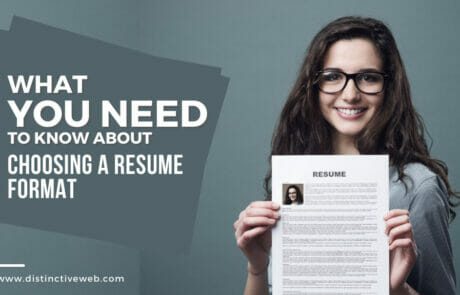
If you are conducting a job search or planning to soon, your resume will likely be the most important document that you create. Your resume is a strategic document, and the best resumes are laser-focused on getting you the desired job.
A resume is not an opportunity to brag about every single accomplishment you’ve ever had. The skills, qualifications, and achievements you put on your resume should be tailored for the type of job you are targeting. This means that when it comes to the content you include, what NOT to put on a resume is just as important as what you put on a resume.
Your resume is not your autobiography; in most cases, it shouldn’t even be a complete record of every previous job you’ve held. Everything you put on a resume should have a purpose and help support your candidacy for the jobs you are targeting.
Hiring managers are swamped with resumes and will only spend a few seconds looking at yours before deciding whether or not to screen you out or screen you in.
It’s essential to make those precious seconds count.
Here then, are some guidelines to help you determine what to leave off your resume and make it as tight, succinct, and powerful as possible.
1) Your Career Objective
Including a job search objective section on your resume is an old-fashioned technique that most career experts now advise against.
Why?
Simple. Resume objectives are all about you and what you want. On the other hand, the best resumes are all about the prospective employer and how you can meet the potential employer’s needs.
This is a subtle difference but an important one.
However, this does not mean you shouldn’t strive to find ways to focus your resume. Focused resumes are effective resumes.
But how do you establish focus if you haven’t included an objective? The answer is with a resume summary statement.
A modern, well-written resume always begins with a powerful, focused resume summary statement. Write your resume summary to immediately convey the focus of your job search while also showcasing the most important facts and relevant skills for the job you are targeting.
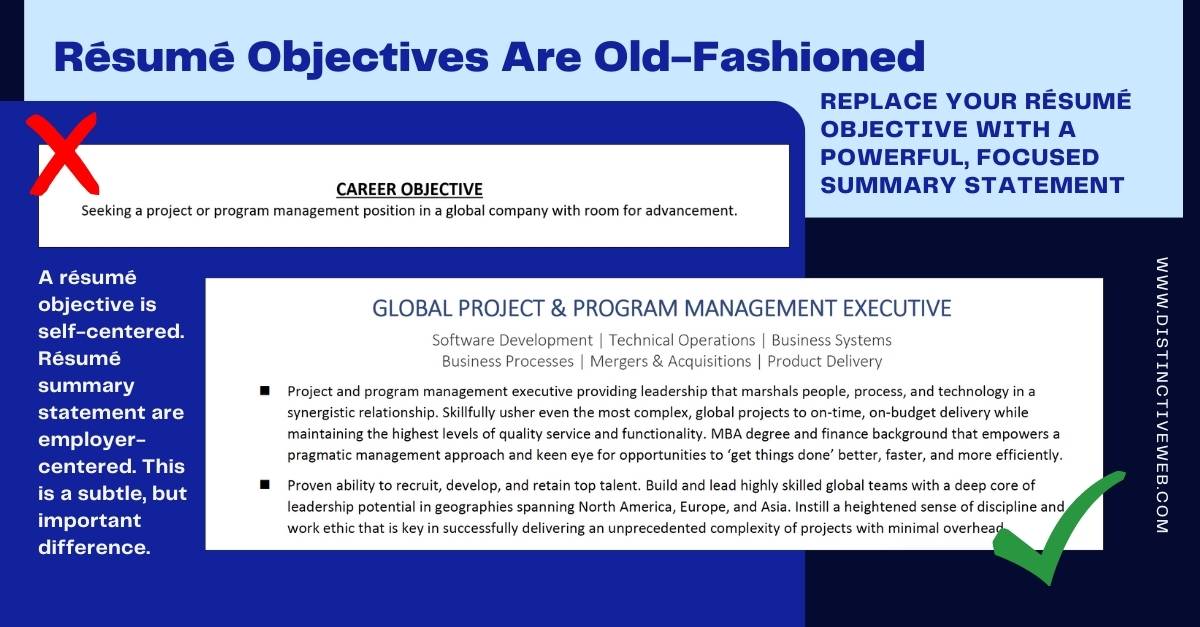
2) Older or Irrelevant Education
If you have completed college or taken any coursework toward a college degree, the hiring manager or recruiter reading your resume does not care about your high school diploma. Leave your high school education off your resume and use the room for more relevant experience.
Potential employers also do not care about training you have taken unrelated to the job you are applying for. Leave irrelevant training and certifications off your resume. While you might be quite proud of the ballroom dancing lessons you completed, all this would do is distract from your target job search goal of a sales job in an IT company.
3) Ancient Work History
As you write your resume, you may be tempted to include older employment experience to showcase the breadth of your experience. Many job seekers make the mistake of including every job in their work history right back to the beginning.
Don’t.
Including older employment experience too far back in your work history can actually work against you. Doing so dates your resume and exposes you to potential age bias. Besides, hiring managers are looking for candidates who are up-to-date with the latest skills and trends. The software you worked with 20+ years ago is almost certainly not relevant any longer.
Additionally, including dated experience on your resume can make it appear that you are unable or unwilling to let go of the past. Instead of looking back, focus on highlighting your most recent and relevant experiences. By doing so, you will signal to potential employers that you are forward-thinking and eager to contribute to their team.
For most job seekers, this means dating your resume no more than 10-15 years. In some cases, you might go back further, but this is a strategic decision best made in consultation with a resume-writing expert.
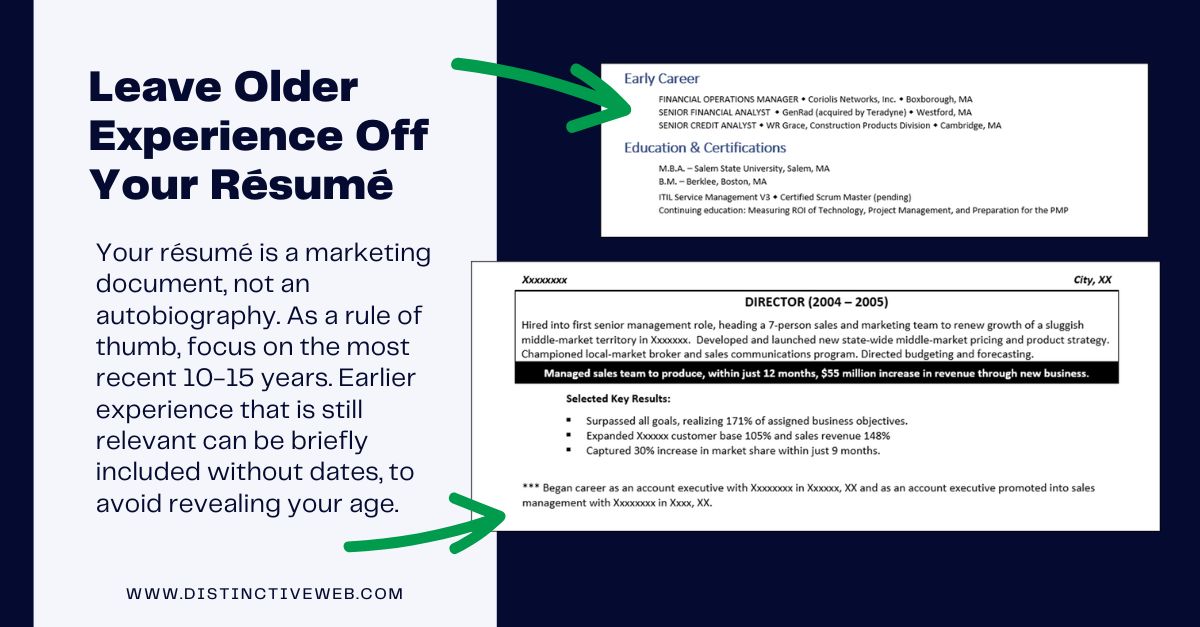
4) Hobbies and Personal Details
Is your resume meant to be used for the U.S. job market? Assuming it is, it should not include your birth date, mention of unrelated hobbies or interests, info about your family, religious beliefs, marital status, height, weight, or any other personal details.
Including such data in a resume meant for the U.S. market may actually eliminate you from consideration, as hiring decision-makers may be concerned about discrimination suits.
5) Your Photograph
Unless your goal is a modeling or acting job, including a photograph of yourself, even the most professional-looking headshot, is a mistake.
One of the most common pieces of advice regarding resumes is “don’t include a headshot.” And for a good reason – photos on resumes can create a number of biases and preconceptions that can work against you, no matter how qualified you may be. For this reason, similar to discrimination concerns when you include personal information on your resume, many hiring managers will screen out resumes with headshots.
Besides, even if you’re not concerned about bias, your photo can still create an impression that you’re not taking the process seriously and are not up to date with business standards.
For these reasons, it is best to err on the side of caution and leave your headshot off of your resume.
6) Political Affiliations
Unless you are pursuing a job directly related to politics, there are several reasons why you should never reveal your political affiliation on your resume.
For one, politics is highly polarizing, and disclosing your views could alienate potential employers with different beliefs.
Additionally, many employers prefer to avoid hiring employees who might bring politics into the workplace and create an atmosphere of tension or conflict.
Finally, revealing your political views on your resume could also lead to discrimination during the hiring process. It’s best to play it safe and keep your politics to yourself.
7. Dense, Wordy Paragraphs
If your resume looks hard or time-consuming to read, very few recipients will take the time to do it. Your writing needs to be concise, and your resume design needs to call out key points at no more than a glance.
Break up long paragraphs. Short paragraphs followed by bulleted resume accomplishments are a great way to achieve this. Selective bolding and italics can also have a positive impact – just be careful not to overdo them.
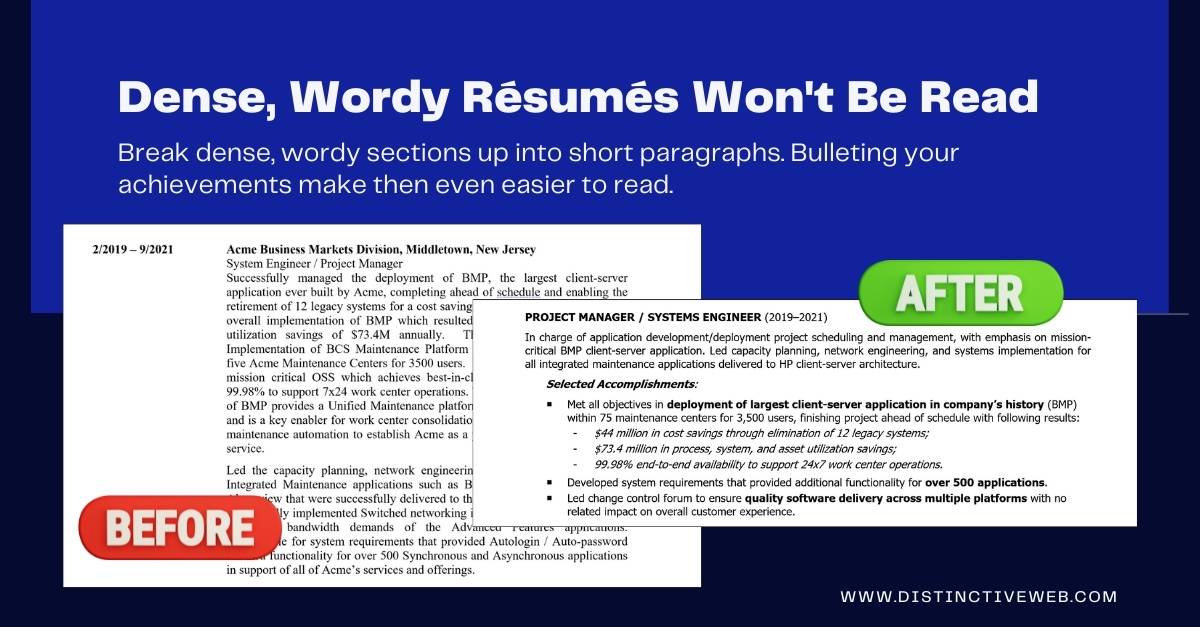
8) Generic Details About Job Responsibilities
When it comes to the question of what not to put in a resume, one of the most common pieces of advice you’ll hear is to leave out job duties and responsibilities.
If you give it a little thought, you’ll understand why.
When you are “responsible for” something, it means you are “supposed to do” something. It doesn’t mean that you DID it. This is one of the most common resume mistakes.
Phrase your resume to describe your position in terms of your accomplishments and how you added value to your employers.
Put yourself in the position of someone looking to fill the job you are applying for. Will the information on your resume convince them they need to bring you in for an interview? If not, delete it and include more relevant information.
Instead of listing every responsibility of your past jobs, target your resume copy directly at the job you seek. Include your significant accomplishments, things you are proud of, and demonstrable skills.
Make sure that you are specific about your accomplishments and quantify them. If you increased sales by 10%, say that specifically.
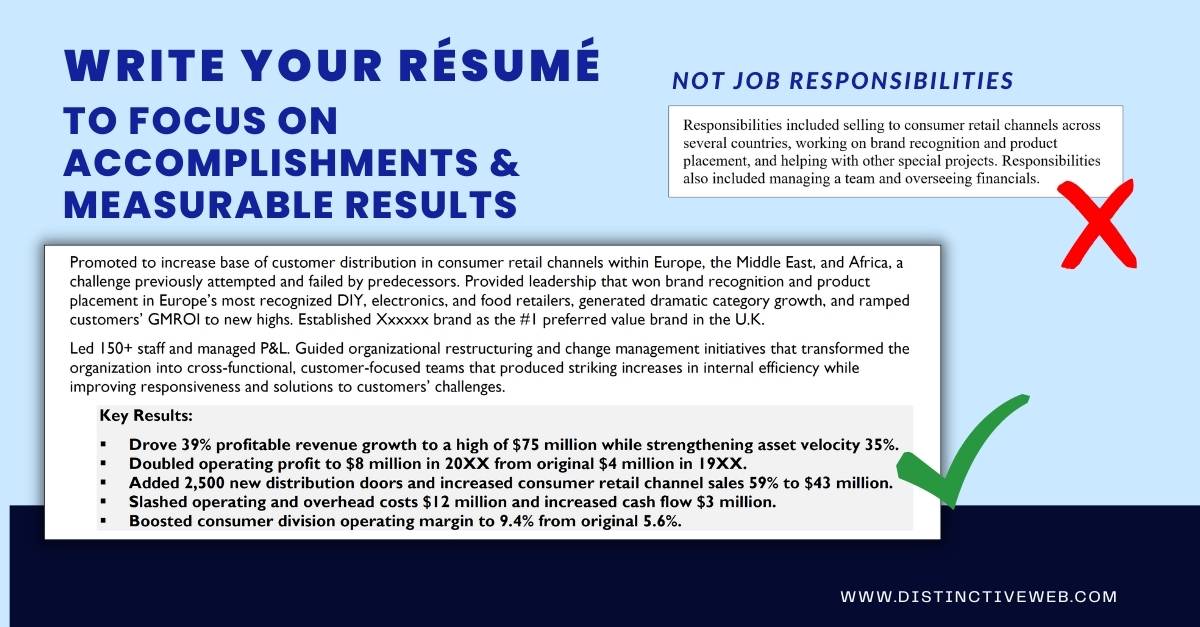
9) Salary Information
Your current salary or other past salary details should never be included on a resume or a cover letter. If a hiring manager asks for salary expectations or your salary history, the best response is to say that salary will be discussed during the interview.
Salary should not be included on a resume because it can create a salary expectation that may not align with the position or the company’s budget. In this way, salary details can also be used to screen you out during the hiring process. Revealing your past salary can also give the hiring manager an unfair advantage during salary negotiations.
For these reasons, it is best to avoid including salary information on a resume or cover letter.
10) Unprofessional Email Addresses
When you’re job hunting, your email address is one of the first things potential employers will see. And first impressions are important! An unprofessional email address (for example, partyguy@email.com or foxylady@email.com) can give employers the wrong impression and seriously hurt your chances of getting the job. No suggestive, flirtatious, or silly addresses!
Also, never use your email address from your current employer! The last impression you want to make is of a person job hunting on her current employer’s dime.
11) Personal Social Media Accounts
It is common and expected that you will include the link to your LinkedIn profile on your resume. If you have a blog or Twitter account used solely for professional reasons, it is acceptable to include them too.
But never include links on your resume to social media platforms you use for personal reasons. Your resume is not a personal document, it is a professional one, and everything on it should relate to your professional goals. A Facebook account where you share photos from your last cruise vacation is not relevant or helpful.
12) References Available Upon Request
Yes, you have references available if the prospective employer asks for them. This is taken for granted. There is no need to take up valuable real estate, stating this on your resume.
Also, never include actual references on your resume or along with your job application. References should be provided during or after the interview after you’ve established your interest in the position and the employer has shown interest in hiring you too. Otherwise, they’ll just be used as another way to screen you out.
13) Too Much Emphasis on Soft Skills
Soft skills are often lauded as the key to success in the professional world. After all, being able to effectively communicate, collaborate, and problem-solve are essential in any workplace, and these are critical transferable skills.
However, there is such a thing as including too many soft skills or putting too much emphasis on soft skills in your resume
For one thing, employers are looking for hard evidence that you have the soft skills they’re looking for. Simply listing “excellent communication skills” on your resume is not enough. Instead, provide specific examples of times you’ve used your soft skills to succeed.
Additionally, don’t forget that hard skills are at least just as critical and often more so. In many cases, employers are looking for candidates with specific technical skills and knowledge. But with hard skills, too, don’t just list them. Always include real accomplishment examples that show how you used your hard skills in practice to deliver value to your employers.
14) Lies or Blatant Exaggerations
Your resume is a tool to sell yourself to potential employers. As such, everything on your resume must be truthful.
Lying on your resume, even about minor things, can damage your credibility and make it difficult for employers to trust you.
Furthermore, if you are caught lying on your resume, it could cost you the job opportunity. It is always better to be honest on your resume.
If you are tempted to stretch the truth or exaggerate, it is likely because you feel insecure about your qualifications. If this sounds familiar to you, a professional resume writer can help! Professional resume writers are adept at how to help you truthfully highlight your achievements and present yourself in the best possible light.
15) Clichés, Jargon, and Unnecessary Words
Vague cliches, stale jargon, and overused buzzwords should have no place on your resume. Employers and recruiters are interested in what you have done and how you have contributed. Flowery language and clichés without fact-based accomplishment statements to prove them will hurt you rather than help you.
Avoid words and phrases such as hardworking, detail-oriented, self-motivated, team player, go-getter, or outside-the-box thinker unless you provide concrete examples that prove and illustrate your claims.
If the buzzwords you have included in your resume are common words in the profession or industry you are targeting in your job search, they may be important keywords. Including keywords in your resume that potential employers would use to describe the qualifications sought in a candidate is essential. The right keywords help your resume perform well in applicant tracking systems (ATS).
On the other hand, don’t just fill your resume with keywords without thought. Keywords describing your relevant skills should be included within the context of your accomplishments, providing proof that you have these skills.
Do distinguish between industrywide terms and company-specific jargon. Some companies use internally invented words and phrases to describe things (systems or processes, for example) that are specific to that company. Never include company-specific jargon in your resume, as it will not make sense to anyone outside your company.
A Few More Things NOT to Put on Your Resume
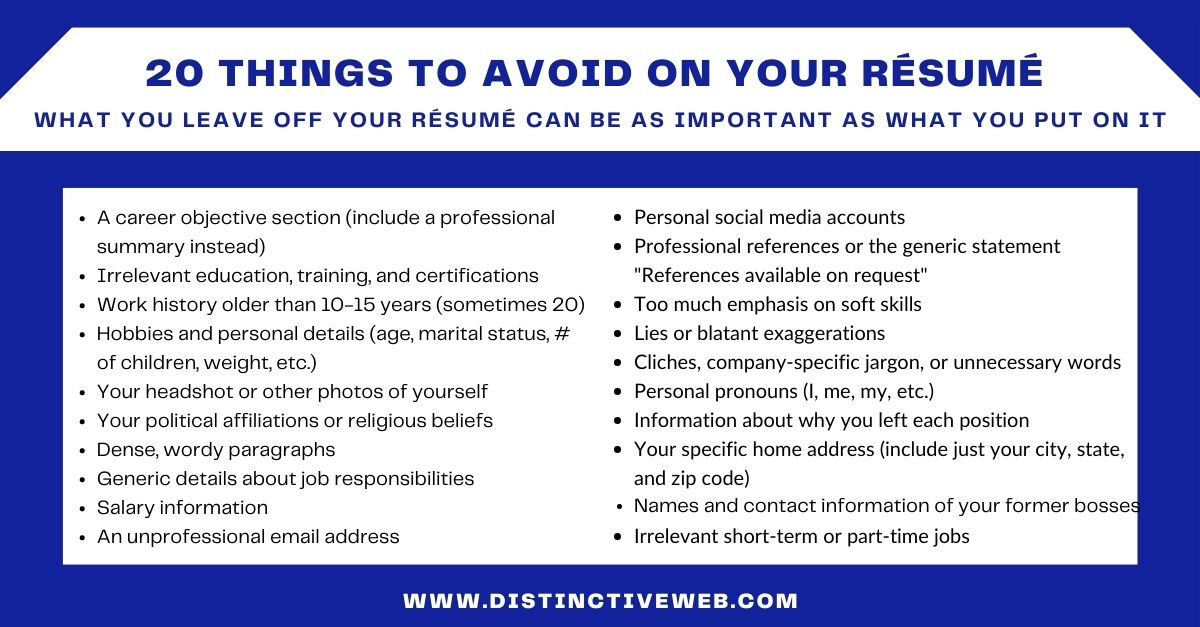
Some Final Thoughts
Your resume is one of the most important documents you will ever write. Knowing what to include on it and what to leave off is important. With these 21 tips, you will be well prepared to make a great first impression with your resume.
But if you want help putting together a resume that really shines, we can assist you. Book a free resume writing consultation today, and let us show you how our professional resume writing services can take your job search from good to great.



